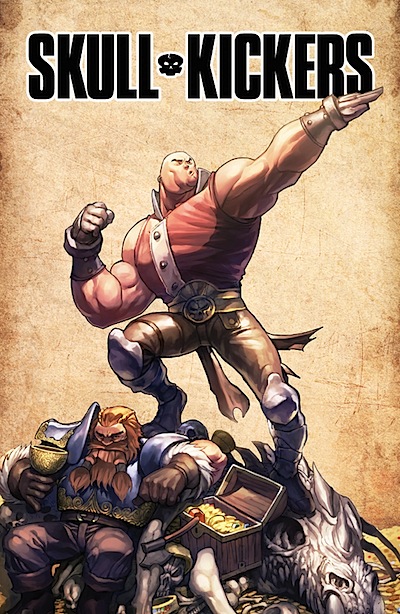By now, it seems a lot of people have taken advantage of Kyle Baker’s decision to put his stellar body of graphic novels up for free online. While it’s a windfall for readers, at Robot 6, Corey Blake asked “Does ‘free’ devalue comics?” While free sampling is a staple of marketing, it also has drawbacks:
Make no mistake: As a consumer, free is a great price! In fact, it’s my favorite price! But some argue that free cheapens the finished product and devalues the work put into it. Some go so far as to argue it can even make the product less desirable because consumers question whether it’s any good if it’s being given away for nothing. I think that can be true, but it comes down to what are you giving away. Free stickers of something I may or may not know? Yeah, no thanks. Free comics from an Eisner-winning, world-class cartoonist who can make you laugh and break your heart whenever he wants? Yes, please!
Along these lines, Jim Zub had yet another one of his number-filled postings called Digital and Print: 1 Year of Skullkickers Online in which he analyzed the results of serializing his SKULLKICKERS comic online. For him, there has been no downside:
As I mentioned in my post over the summer about convention sales, print and digital are working together pretty harmoniously. Our print numbers aren’t hurting because of online serialization and some of our online readers are becoming print buyers, especially the collected trade paperbacks and deluxe hardcover ‘Treasure Trove’ edition. Retailers who stock the series are benefiting from our online outreach, not hurting from it.
When readers become really attached to the series online they’re willing to buy a print copy, both for their own enjoyment and as a measure of support for our hard work. Sure, the majority of people will casually read it online for free but, by casting such a wide net to potential new readers, I’m able to expand book sales overall, reaching more and more people each month long after individual print issues have sold out. The hard-to-find early issues are absolutely crucial because they’re the entry point for new readers. Thanks to the online site they’re always available. You can start reading Skullkickers right now, right here.
Getting back to Baker, his move is a bit more on the promotional side, although it was also stealthy. As he explained to me in an email:
Those books have been on my site for months. What changed recently is; I added Facebook and Twitter buttons to my site this weekend, and so visitors were finally able to share the pages they like. Social media being what it is, the pages went viral, and there you go. I recently acquired the rights to all of my DC/Vertigo titles, and am setting up a new publishing deal, which will most likely include digital rights, so I’m taking advantage of this window of opportunity to post them on my site while I’m able.
My favorite element of internet distribution is the access to statistics. The last few days have seen a significant increase in traffic and ad revenue, so technically I’m not giving these books away for free. The stats are telling me where traffic’s coming from, which pages are most popular, etc. I’ve been able to use the numbers as a guide to make improvements to the site over the last few days for a better visitor experience.
As Blake pointed out, only three of Baker’s books are in print; building up an online audience for the next print version of his work is a solid move; buzz has been created where there was none before.
Zub’s and Baker’s experiences show that in the attention economy, awareness is as good as money.





The minute I saw Kyle Baker’s stuff for free, it reminded me it was all stuff I had intended to have on my bookshelf. Between Amazon and a couple of other sites, they are all on their way to me now.
Anecdotal, I realize, but I can’t be the only person who has this reaction.
I liken it to television.
People will watch their favorite shows for “free”, but many still choose to buy those shows on DVD or blu-ray — to enjoy whenever they want, without the ads and often with bonus content.
I found that the commentary about free comics devaluating the experience are extremely ignorant when we are in the era of the webcomic, when hundreds and hundreds of cartoonists are offering their work absolutely free week after week, not expecting a dime beforehand, only out of pure love for the art and craft, and some of them have been some of the best comics of the new century. Free doesn’t devaluate the work-rather, it releases it of the expectations one has when reading a paid work, in which many times one can end up asking himself ‘was it worth it’ instead of ‘was it good’. Whether they like it or not, free is the future, and their options are either adapt or dissapear, something Baker has understood clearly.
I understood this in 2006.
Kudos to Zub and Baker.
Build. Grow. Sell.
More people will read Kyle Baker comics now than most of the top 10 selling comics of any given month. Availability. It helps.
This move on Kyle’s part enables me to introduce his stuff to far more people than I could ever give or loan a book to. I’m on my 4th copy of Saturn already!
But despite the idea of it being available to everyone, everyone is not going to see it. the digital model is as limited as the brick and mortar, there’s a digital bottle-neck that once you’ve tapped your audience and the series is complete…your going have to crowd-fund, self-publish, or find a publisher. you gotta play both fields and no matter where you start, your going to eventually end up on the other side.
Comments are closed.